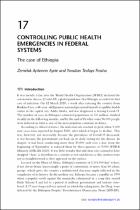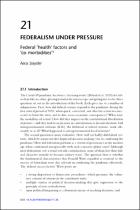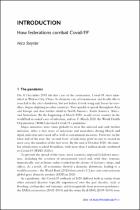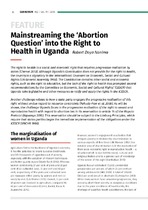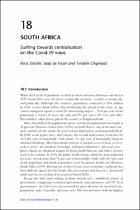Browsing Book and Book Chapters (Faculty of Law) by Subject "Public health"
Now showing items 1-5 of 5
-
Controlling public health emergencies in federal systems
(Routledge, 2021)It was merely a day after the World Health Organization (WHO) declared the coronavirus disease (Covid-19) a global pandemic that Ethiopia recorded its first case of infection. On 12 March 2020, a week after entering the ... -
Federalism under pressure: Federal ‘health’ factors and ‘co-morbidities’
(Routledge, 2021)The Covid-19 pandemic has been a ‘focusing event’ (Béland et al. 2020) for federalism like no other, placing it under the microscope and giving rise to the three questions set out in the introduction of this book. Each ... -
Introduction: How federations combat Covid-19
(Routledge, 2021)On 31 December 2019, the first cases of the coronavirus, Covid-19, were identified in Wuhan City, China. Its dramatic rate of transmission and deadly effects soon led to the city’s shutdown, but not before it took wing ... -
Mainstreaming the ‘Abortion question’ into the right to health in Uganda
(Dullah Omar Institute, 2021)The right to health is a social and economic right that requires progressive realisation by states (Chenwi 2013). Although Uganda’s Constitution does not provide for the right to health, the country is a signatory to the ... -
South Africa: Surfing towards centralisation on the Covid-19 wave
(Routledge, 2021)When the Covid-19 pandemic reached its shores between February and March 2020, South Africa was already in a vulnerable situation – socially, economically, and politically. Although the country’s population, estimated ...

